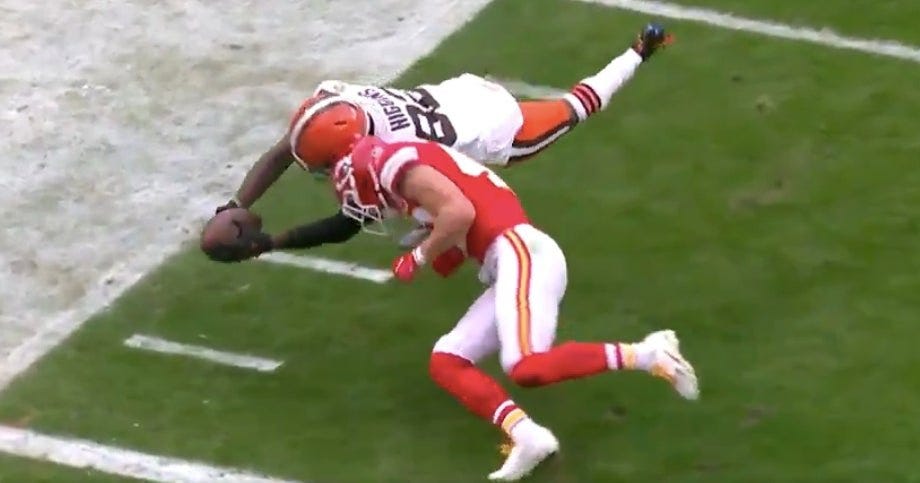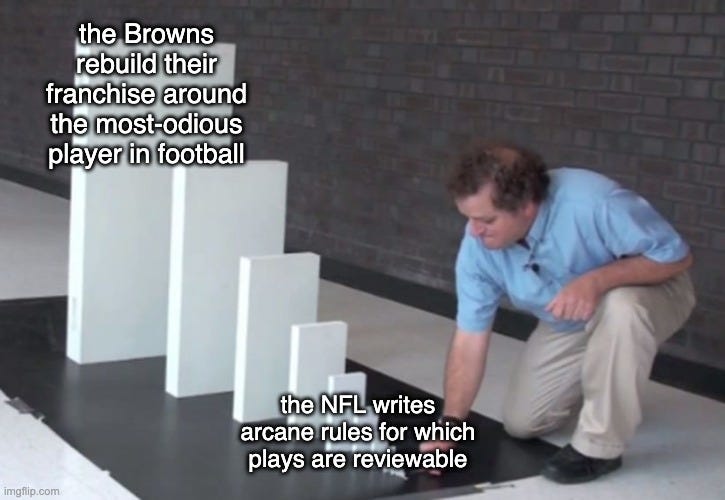Baker Mayfield and the Precarity of Sports Narratives
How a single blown call changed the trajectory of the Cleveland Browns
It was January 17, 2021. The Cleveland Browns were down 13-3 to the Kansas City football team (appropriative names like “Chiefs” are harmful even if not intended as such) in the second round of the NFL playoffs with under two minutes left in the first half. With Cleveland in desperate need of a spark, quarterback Baker Mayfield completed a 23-yard pass to receiver Rashard Higgins to put the Browns just outside the red zone.
A play later, Mayfield found Higgins open again. The receiver caught the ball at the five-yard line and lunged for the end zone. Then disaster struck.
Kansas City defender Daniel Sorenson smashed into Higgins helmet-first inside the one-yard line. Higgins fumbled the ball, which bounced into the end zone and then out of bounds. Per NFL rules this resulted in a touchback, meaning Cleveland’s drive immediately ended and Kansas City got the ball; they promptly kicked a field goal to make it 16-3 going into halftime. The Browns went on to lose 22-17.
On its face, this was a classic example of the Browns’ ineptitude, something I’m well accustomed to as a Clevelander. (Until last year, they hadn’t won a playoff game since I was two years old.) Yet this crucial fumble came courtesy of a dirty hit. The NFL rules prohibit a player “lower[ing] his head to initiate and make contact with his helmet against an opponent.” Or in other words, exactly what Sorenson did to Higgins:
There’s no ambiguity that this hit was illegal. Look at how Sorenson’s arms are tucked into his torso — he’s not even pretending to tackle Higgins normally! Throwing a penalty flag for this headshot would have rendered the fumble null and void. But the referees missed the call, and at the time helmet hits were not subject to replay review. So there was nothing to do but complain, and since the Browns’ season was over within the next couple hours, fans had plenty of time for that.
True to form, the Browns’ next season was a messy one. They followed up on their long-awaited underdog playoff run by finishing under .500 last year. Star receiver Odell Beckham Jr. was released after locker-room discord spilled out onto social media. At the center of all the drama was Baker Mayfield, the former #1 overall pick who’d led Cleveland to their best season of my lifetime but has been plagued by inconsistency. The face of the franchise through the success of 2020 became the symbol of the disappointment in 2021. By the end of the season, the Browns had made it clear that they were moving on from Mayfield under center.
No one outside the organization can really know what happened or who’s to blame for their breakup. I tend to be sympathetic to Mayfield given how blatantly the Browns disrespected him, from not putting Mayfield in good position to succeed in 2021, to putting the blame for the disappointing season on his torn and fractured shoulders while he played through injuries, to refusing his initial requests to be traded after the team started looking for his replacement. Still, it’s hard to say he’s blameless when he apparently pissed off his former teammates so badly that they can’t hide their disdain for him. Maybe it’s ultimately as simple as the fact that Mayfield’s signature brashness is a lot less endearing when the team is losing.
Fast forward to today. As the 2022 NFL season gets underway, Cleveland has a new star quarterback, Deshaun Watson. Well, they don’t have him yet, because he’s serving an 11-game suspension after being accused of 30 instances of inappropriate sexual behavior, from harassment to assault. The whole fiasco is fundamentally oxymoronic: The Browns think having a great quarterback is so important that they gave up three years of first-round picks, $230 million, and any shred of moral decency to acquire one who’s better than Mayfield…yet they are also so confident in the quality of the rest of the team that they’re okay with starting a backup for two-thirds of the season.
And I can’t help but think it’s all because of the dirty hit on Higgins.
No matter what happened at the end of the first half against Kansas City, the Browns would have been losing at halftime. If Higgins had crossed the pylon for a touchdown, or if the Browns had scored after starting the next play inches from the goal line — a penalty for Sorensen’s illegal hit or even a lateral out-of-bounds fumble would have put them in great field position — the score would most likely have been 13-10. Yet given that Kansas City won by five points, that would have been enough to turn a 22-17 loss into a 24-22 victory.
It’s a vast oversimplification to say that the rest of the game would have gone the same way had the Browns found the end zone before halftime. Both teams would have called different plays if the score had been closer. Kansas City quarterback Patrick Mahomes may not have gotten injured in the third quarter, meaning they likely would have scored more late-game points than they did with backup Chad Henne under center. But the simplest counterfactual to entertain is the one that holds everything else constant, and in that case the missed penalty call on Sorensen cost Cleveland the game. Even if they had failed to score a touchdown from first-and-goal, running down the clock before a chip-shot field goal (thus depriving Kansas City of their last-minute points) would have ultimately put them ahead 20-19.
If Mayfield had led the Browns to a second playoff win, how far could they have gone? A week after beating Cleveland, Kansas City dismantled the Buffalo Bills 38-24. Those Bills were a very good team, but they didn’t look like it in the AFC Championship Game. I remember watching Kansas City pick Buffalo apart and saying: The Browns would have crushed these guys. I don’t think they would have beaten the Tampa Bay Buccaneers, who demolished Kansas City 31-9 in the Super Bowl that year. But I do firmly believe in my heart of hearts that if the referees had thrown a flag for Sorensen’s headshot, or if such calls were subject to replay review, Cleveland would have at least made it there.
If Mayfield had indeed led the Cleveland Browns, the most-hapless franchise in American sports, to the Super Bowl? The conversation this offseason would have been very different. Getting to the championship game would have given him more gravitas. It would have earned him more benefit of the doubt from both inside and outside the locker room. It would have made dismissing him as not a championship-caliber quarterback a tougher sell. Right or wrong, fair or not, it would have made the Browns less likely to move on from him this summer — meaning Cleveland fans wouldn’t have to watch a sexual predator the backup quarterback who’s filling in for a sexual predator while he’s suspended suit up this weekend.
Sports are full of what-ifs and close calls. A bad bounce here, a millisecond’s difference in reaction time there, and a player standing a few inches that way would be enough to rewrite the history of an entire sport. Debating how things could or should have gone is part of the fun of being a fan. But there’s no way to know for sure, and the flags fly forever for whomever the little things break their way. After a decade of working in sports, I can tell you that there’s no trophy for making the most moves that looked smart at the time.
Still, I think there’s something to be said for acknowledging how fickle the foundations of sports narratives can be. The Philadelphia Eagles might not have attempted the legendary Philly Special had Tom Brady not dropped a pass in a similar play a few minutes earlier. A blown call cost Armando Galarraga a perfect game and may have given one to Philip Humber. And the inability to challenge for a penalty on one of the dirtiest hits I’ve ever seen ultimately led to the Browns forsaking the best quarterback they’ve had in decades for a man I’m ashamed to have as the face of my favorite team.

No one wants to hear your gripes about what should have happened. History records the dids, not the almosts. But as we kick off our collective seasonal ritual of yelling at the TV every Sunday, it’s both humbling and healthy to remember how much of an athlete’s legacy is literally in someone else’s hands. There’s a very fine line between a goat and a GOAT — especially when you’re also dealing with zebras.





